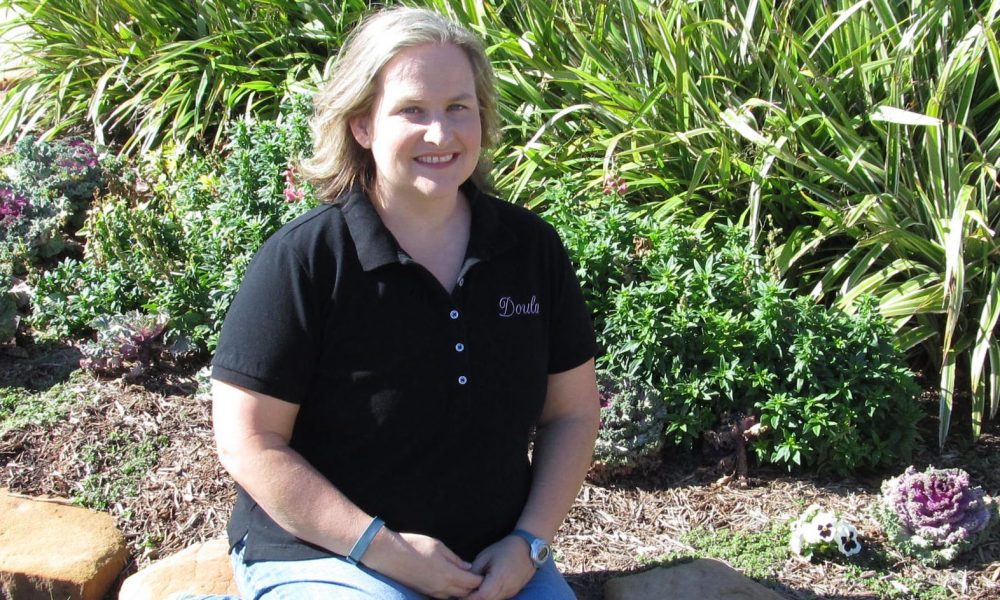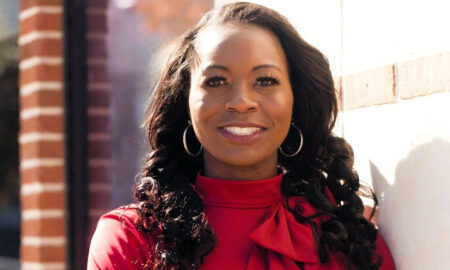

Today we’d like to introduce you to Ashley Klemm.
So, before we jump into specific questions about the business, why don’t you give us some details about you and your story.
After the birth of my second child, I began to sense a calling to birth work. I tried to ignore it for several years but finally realized that the calling refused to be silenced. I spoke with my own midwife and began self-study in preparation for the time when I could begin formal study and apprenticeship to become a midwife. After a life detour to Canada for a few years, we returned to Houston and got things in place (needed grandparents to move here to help with my own five kids when called to a birth) to begin midwifery school. My midwife recommended that I do a little doula work first to get my feet wet, so to speak. I am so glad she did! I am now so happy in the area of doula work that midwifery is off my radar. I love that I can support families no matter where they choose to give birth, no matter what risk factors might be present, and no matter what their birth preferences might be. My own five pregnancies and births have run the spectrum from unplanned C-section to hospital birth with an epidural to home birth. When I say to clients, “I know what you are going through”, chances are I really do!
I chose to train and certify through a nationally recognized organization, Childbirth and Postpartum Professionals Association (CAPPA). The CAPPA certification process is quite in depth. After multi-day hands-on training, I had to complete two other classes pertaining to birth and babies, a breastfeeding class, and complete required reading. I had to have evaluation forms completed by doctors/midwives, nurses, and clients for each of my certification births. After completing course requirements I had to successfully pass a lengthy test, including both multiple choice and essay questions. Completion of the CAPPA certification process can take up to two years. CAPPA training was the perfect complement to my previous self-study of midwifery and my own birth experiences.
I stay current with the latest research and seek out opportunities to continue my education. I have completed an advanced doula training and certification in the Rebozo technique and also a Spinning Babies training taught by Gail Tully. In December, I will be trained in acupressure for birth professionals. I have completed a 15-hour online training on pregnancy loss through the Institute for the Study of Birth, Breath, and Death. I am a trained Hypnodoula through Hypnobabies. I have also completed additional training in perinatal mental health. I am fully equipped to support families well no matter what path their births take.
Has it been a smooth road?
One of the biggest challenges in this work is the unpredictability of birth. My kids know that whether it is a birthday, Christmas, or any other occasion, I might have to go at a moment’s notice. I support women for the duration of their labor and birth which means that I don’t have set hours. I have been with a client as long as 40 hours for her birth. When I walk out the door, my family doesn’t know when they will see me again. Thankfully my family fully supports me in this work.
So let’s switch gears a bit and go into the Ashley Klemm Birth Services story. Tell us more about the business.
As a doula, I provide informational, emotional, and physical support for women throughout their pregnancy, birth, and postpartum period. What does this look like? Informed decision making is so important to me. I believe that when women have all the information about risks, benefits, and alternatives, they can make good decisions for themselves. Birth support isn’t about encouraging someone to make the same decision I would, or trying to sway their decision. It isn’t my birth! So one of my big priorities is helping with this information gathering and helping each family explore their options.
Pregnancy, birth and postpartum changes can bring a flood of emotions. When there is something concerning during pregnancy, my clients know that I am there to listen to what they are experiencing and hold that space for them without judgment. When pregnancy seems to be dragging on forever in those last few weeks, I am there to encourage them to finish strong and hold on to those points that had been important to them. During labor, I provide an objective sounding board as my clients work through decisions and changes of plans. I stay alert for signs of perinatal mood disorders and refer my clients to mental health professionals when indicated.
I am a contact point during the postpartum period when sleep deprivation, hormonal changes, and feeding difficulties can leave emotions spinning out of control. In the realm of physical support, I am able to assist with physical comfort measures during labor. I am knowledgeable about different positions for labor which can help the baby rotate and descend easier.
As a doula, I support birth partners too! Birth is a life-changing event for the entire family. The birth partner can feel a huge weight of needing to remember the things learned in childbirth class, wanting to make sure everything unfolds according to the mother’s preferences, and then the struggle of watching her work hard in labor. I like to help carry that weight. As a professional who has supported many births, I have knowledge of labor and birth, can help navigate and facilitate communication between the birthing family and their medical care providers, and can reassure the partner that the birthing mother’s body is working beautifully. Having a doula allows the birth partner to take a nap, grab a snack, or otherwise take a break without concern over the birthing woman being left alone. I do not aim to replace the partner but to support the partner in his/her preferred level of involvement. For those partners who want to be fully hands-on, I can offer guidance in this. For those who prefer to be on the sidelines but want to know their loved one is fully supported, I can take on that role too.
Sometimes people have an idea that a doula is like a gatekeeper – someone to stand at the door and make sure no one does anything the birthing woman does not want. I do not see this as my role. I prefer the approach of a bridge builder. I help facilitate respectful and clear communication between my client and her medical care providers. We work together as a team, and my client receives excellent care as a result of this approach.
It is important to note that a doula is not a medical care provider. As a doula, I do not check blood pressure, fetal heart tones, or perform cervical exams. A doula works alongside your doctor or midwife to complete your birth team. For more information on the role of doulas, please visit www.EvidenceBasedBirth.com/doulas.
I work to develop relationships with my clients during pregnancy so that when it comes time to give birth, I am more like a trusted friend in the room than an unknown professional. I will be the constant, unwavering presence in her room throughout her entire labor and birth. Nurses will change shifts – I will not. Doula work is definitely a work of the heart. I pour my knowledge, love, and presence into each family I am blessed to serve.
I saw a graphic recently that said “You’ve got this. I’ve got you”. I think that really sums up my heart. I believe women already have within them the power to have a positive birth. I am there to walk with my clients through it, to encourage them when things get hard, to hold them up when they think they are going to fall, and to see them through the struggles and into the victory. I am passionate about birth and compassionate towards women. This is what makes my heart sing. This is the very work I was created for.
How do you think the industry will change over the next decade?
I see doula support becoming more prevalent in the years ahead. As this field of professional labor support grows, women and babies will benefit! The American Congress of Obstetrics and Gynecologists has acknowledged this benefit in the February 2017 Committee Opinion. “Evidence suggests that, in addition to regular nursing care, continuous one-to-one emotional support provided by support personnel, such as a doula, is associated with improved outcomes for women in labor.
Benefits found in randomized trials include shortened labor, decreased need for analgesia, fewer operative deliveries, and fewer reports of dissatisfaction with the experience of labor (1, 17). As summarized in a Cochrane evidence review, a woman who received continuous support was less likely to have a cesarean delivery (RR, 0.78; 95% CI, 0.67–0.91) or a newborn with a low 5-minute Apgar score (fixed-effect, RR, 0.69; 95% CI, 0.50–0.95) (1). Continuous support for a laboring woman that is provided by a nonmedical person also has a modest positive effect on shortening the duration of labor (mean difference –0.58 hours; 95% CI, –0.85 to –0.31) and improving the rate of spontaneous vaginal birth (RR, 1.08; 95% CI, 1.04–1.12) (1).” (https://www.acog.org/Resources-And-Publications/Committee-Opinions/Committee-on-Obstetric-Practice/Approaches-to-Limit-Intervention-During-Labor-and-Birth) With this backing, insurance might begin to recognize the benefits of doula support and begin reimbursing doula services in the future.
Pricing:
- Complete doula support package (throughout pregnancy, labor, and to six weeks postpartum) $800
Contact Info:
- Website: www.AshleyKlemmBirthServices.com
- Phone: 832-823-8610
- Email: AshleyKlemmDoula@gmail.com
- Facebook: https://www.facebook.com/ashleyklemmdoula/
- Yelp: https://www.yelp.com/biz/ashley-klemm-birth-services-tomball








Getting in touch: VoyageHouston is built on recommendations from the community; it’s how we uncover hidden gems, so if you know someone who deserves recognition please let us know here.

















